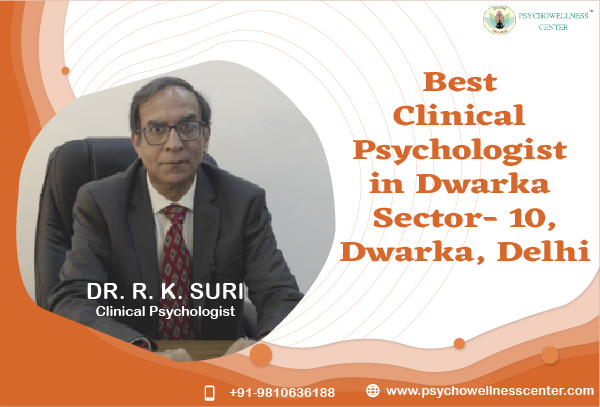Best Clinical Psychologist in Dwarka Sector 10 Dwarka Delhi

Mental health and mental illness are terms often used interchangeably, but they are not synonymous. Both concepts are integral to understanding psychological well-being, yet they represent distinct aspects of the human experience. Mental health refers to a state of emotional, psychological, and social well-being, whereas mental illness encompasses conditions that disrupt this equilibrium. Understanding the distinction between the two is crucial for fostering awareness, promoting prevention, and encouraging early intervention.
What is Mental Health?
Mental health is a dynamic state that affects how individuals think, feel, and behave in daily life. Good mental health does not mean the absence of challenges; rather, it implies the ability to cope with life's ups and downs effectively.
Key Aspects of Mental Health:
- Emotional Well-Being: The capacity to process emotions like happiness, sadness, or anger in a healthy manner.
- Psychological Resilience: The ability to bounce back from adversity, adapt to change, and maintain a sense of control.
- Social Functioning: Healthy relationships and the ability to communicate and interact positively with others.
Mental health is influenced by various factors, including genetics, environment, lifestyle, and life experiences. Practices such as mindfulness, exercise, and seeking support can contribute to maintaining and enhancing mental well-being.
What is Mental Illness?
Mental illness, on the other hand, refers to diagnosable conditions that significantly impact a person’s thinking, mood, or behaviour. These disorders often require clinical attention and may vary in severity from mild to severe. Common mental illnesses include depression, anxiety disorders, bipolar disorder, and schizophrenia.
Characteristics of Mental Illness:
- Persistent Symptoms: Unlike temporary stress or sadness, mental illnesses involve long-lasting symptoms that interfere with daily functioning.
- Impact on Daily Life: They may hinder work, relationships, and self-care.
- Need for Professional Help: Effective management often involves therapy, medication, or both.
It is important to note that mental illness does not define a person’s entire identity. With appropriate care and support, individuals can live meaningful and fulfilling lives.
How to Differentiate Mental Health Struggles from Mental Illness?
It is normal to experience emotional fluctuations or stress. However, when these feelings persist or worsen, it may indicate a mental health condition. For instance:
- Feeling sad for a few days is different from experiencing persistent depressive symptoms that last for weeks.
- Occasional worry about a presentation is not the same as chronic anxiety that interferes with daily tasks.
Seeking professional help is essential when emotional or psychological difficulties persist and interfere with life.
The Role of Early Intervention
Early intervention can prevent mild mental health challenges from escalating into full-blown mental illnesses. Strategies such as education, awareness campaigns, and accessible mental health services are vital. When individuals recognise the difference between mental health and mental illness, they are more likely to seek help without hesitation.
Psychowellness Center: A Haven for Mental Well-Being
Psychowellness Center is a trusted name in mental health care, dedicated to bridging the gap between mental health and mental illness. The center offers a holistic approach to mental well-being through therapy, counselling, and psychological assessments. With a team of skilled professionals and best psychologists, the center focuses on creating personalised care plans to meet individual needs. From anxiety management to emotional resilience building, Psychowellness Center is committed to empowering individuals toward better mental health.
- Dr. R K Suri, is the driving force behind Psychowellness Center. He specialises in cognitive therapies and psychological assessments. His patient-centric approach emphasises the importance of mental health education and preventive care. Through his work, Dr. Suri has inspired countless individuals to seek help and prioritise their mental well-being.
- Mrs. Kala Sengupta is a compassionate and experienced counsellor at Psychowellness Center. Her expertise lies in family counselling and relationship therapy, where she uses empathy-driven approaches to foster understanding and healing. With a focus on mental health advocacy, Kala believes in empowering individuals to navigate life's challenges confidently.
- Mr. Utkarsh Yadav is a dedicated mental health professional specialising in anxiety, trauma, panic attacks, and stress management. His innovative techniques blend traditional therapy with modern methodologies, making mental health care approachable and effective. Utkarsh's focus on mental illness has made him a prominent voice in the field.
- Ms. Sakshi Dhankhar is a skilled psychologist passionate about working with children and adolescents. Her expertise includes addressing developmental challenges, workplace stress, and emotional regulation. Sakshi’s holistic approach ensures that young individuals feel supported and understood in their mental health journey.
- Ms. Tanu Sangwan is a licensed therapist known for her work in trauma, self-esteem, excessive fear, behavioural issues, autism, ADHD, recovery and emotional healing. With years of experience, Tanu employs evidence-based practices to help individuals rebuild their lives after adversity. Her empathetic approach resonates with clients, creating a safe space for healing.
Conclusion
Understanding the difference between mental health and mental illness is a step toward creating a society that values psychological well-being. While mental health represents an ongoing journey of maintaining balance, mental illness requires targeted interventions. By prioritising mental health awareness and reducing the stigma around mental illness, we can foster an environment where everyone feels supported in seeking help.
Contributed by Ms. Tanu Sangwan, Counselling Psychologist
References
- American Psychological Association (APA). (n.d.). Mental Health and Mental Illness. Retrieved from www.apa.org
- World Health Organisation (WHO). (n.d.). Mental Health: Strengthening Our Response. Retrieved from www.who.int
- National Institute of Mental Health (NIMH). (n.d.). What is Mental Health? Retrieved from www.nimh.nih.gov
.png)



SHARE